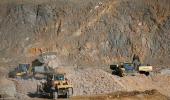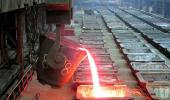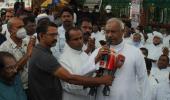The PMK has now lent its voice to the protests against the mining of atomic minerals in Kanyakumari.

The political opposition against IREL (India) Ltd's atomic minerals mining project in Tamil Nadu's Kanyakumari district is slowly gaining momentum with one of the major parties in the state, the Pattali Makkal Katchi, now joining opponents of the project.
Former Union minister and PMK President Anbumani Ramadoss, MP, condemned the state and central governments on September 28, 2024 for approving the project.
The central government should drop the mining project and the Tamil Nadu government should revoke the permission given and also permanently drop plans to hold a public hearing about the project, Dr Ramadoss stated.
Earlier, two smaller parties -- the Tamizhaga Vazhurimai Katchi (TVK) and the Social Democratic Party of India (SDPI) -- had come out against IREL (India)'s atomic minerals mining project in Kanyakumari district.
The public hearing slated for October 1, 2024 has been postponed by the Tamil Nadu Pollution Control Board (TNPCB) without mentioning any dates.
The central government owned IREL (India) has proposed to invest about Rs 35 crore (Rs 350 million) to mine beach sand mineral ore (BSM Ore) consisting of a suite of Monazite, Zircon, Ilmenite, Sillimanite, Rutile, Leucoxene and Garnet over a total area of 1,144.0618 hectarse at 1.50 million ton per annum (MTPA) over a period of 40 years.
The estimated mineable reserves is 59.88 million tonnes. The Heavy Mineral (HM) content in the deposit varies between 10.0% and 22.6% with an average HM content of 14.5%.
In 2021, the Tamil Nadu government gave its concurrence to the project.
According to TVK President T Velmurugan, a member of the Tamil Nadu assembly, the Tamil Nadu Pollution Control Board announced the date for a public hearing without realising the negative impact the project would have not only on Kanyakumari district but on all of Tamil Nadu.
Owing to the theft of BSM in Kanyakumari, Thoothukudi and Tirunelveli districts, Velmurugan and SDPI stated that people's health has been affected adversely.
The Poovulagin Nanbargal, an environment focused non-governmental organisation, has also opposed the project and demanded cancellation of the public hearing.
The NGO has sought a halt to atomic mineral mining in the state's coastal areas and wants a detailed health study to be conducted on the impact of IREL (India)'s operations in Tamil Nadu.
The seven BSM ore occur together in nature by virtue of their formation along coastal stretches and inland areas near the shore and in Teri deposits (note: red sand and silt dunes that are found in the coastal regions of Tamil Nadu) in varying grades in India.
Monazite is a prescribed substance under the Atomic Energy Act, 1962 and a radioactive mineral contains uranium and thorium.
There will not be any acquisition of land for the project. IREL (India) will lease the needed land for a period of 11 months.
Mining and backfilling will be simultaneously carried out within the lease period of 11 months and the land will thereafter be returned to the land owners with lease compensation.
Permanent structures will not be disturbed and the mining will not lead to involuntary displacement of people.
IREL (India)'s Manavalakurichi unit in Kanyakumari district has been in operation since 1970 before the Environmental Impact Assessment and Coastal Regulation Zone notifications came into force in the country.
The unit mines Monazite and Zircon along with other associated minerals and supplies the same to the Department of Atomic Energy and other downstream industries in the value chain.
The Manavalakurichi unit is being operated for an annual consented production capacity of 114,600 tons of atomic minerals.
IREL presently operates in two mining leases for mining of atomic minerals from coastal and inland deposits.
The BSM ore mined out from these leases are transported and separated for individual atomic minerals at the existing mineral separation plant at Manavalakurichi.
Venkatachari Jagannathan can be reached at venkatacharijagannathan@gmail.com
Feature Presentation: Aslam Hunani/Rediff.com










